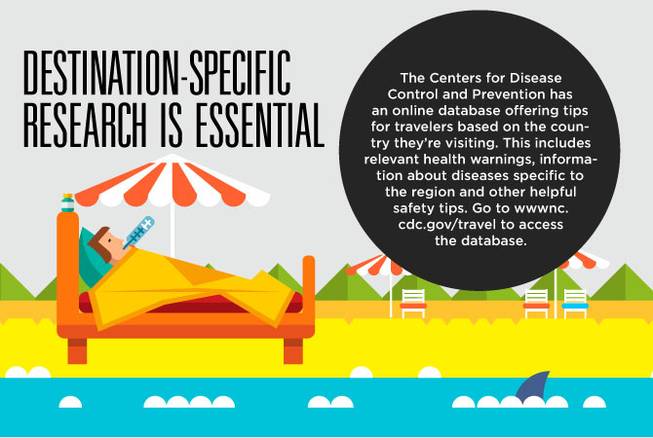
Sunday, June 12, 2016 | 2 a.m.
Vacation is a time for rest and relaxation, but between long flights, airport germs, foreign food and water sources, and jam-packed itineraries, there are plenty of opportunities to fall ill while traveling.
Being sick on vacation is a big disappointment, but it also can be scary and frustrating when you don’t know what to do or where to go for care. “Generally, you should seek medical attention for anything that is quick to come on and significantly affects your ability to do daily activities,” said Jeff Murawsky, MD, Chief Medical Officer at Sunrise Hospital and Medical Center.
Here’s what you should do if you get sick while traveling, and tips for how to avoid it.
Common vacation illnesses and how to prevent them
Some of the most common illnesses that occur while traveling are colds/flus (and other similar viral infections) and traveler’s diarrhea.
Colds, flus and viral infections are common because of the amount of germs in communal environments such as airports, planes, buses and train stations. Washing your hands and using hand sanitizer often are the best ways to limit your exposure to germs. Furthermore, in the weeks leading up to your trip, try to increase your vitamin C intake for an immunity boost and always stay well-hydrated.
Traveler’s diarrhea is most likely to affect international travelers and is typically caused by bacteria in food and water. Usually, the bacteria that cause traveler’s diarrhea are not harmful on their own, but they can upset your stomach if you have not developed an immunity to them. “If you’re in an area where traveler’s diarrhea or food-borne illness is common, be sure that all the food you eat is thoroughly cooked and served hot. Drink bottled water and avoid tap water, well water or any unwashed fruit or vegetables,” Murawsky said.
What to do if you end up getting sick
1. Be prepared and pack a few treatment must-haves. You don’t need to bring your entire first-aid kit, but having basic essentials can be helpful.
2. Seek medical treatment. Deciding if you need to go to a doctor is a personal decision depending on age, existing medical conditions and the severity of symptoms. If you’re bedridden for multiple days, have a persistent fever, or simply feel like something is wrong, you should likely see a doctor. Murawsky also recommends listening to your family or friends who know you best when deciding whether to seek treatment.
3. Call/email your doctor at home or consult a physician online. They should be able to offer guidance about the type of treatment you need and may even be able to diagnose you remotely.
4. Ask your hotel about local doctors, clinics or hospitals. They should be able to give you a recommendation and help you receive immediate care. Some hotels may even offer first-aid services.
5. When traveling domestically, urgent-care centers and emergency rooms are great options. Go to an urgent-care center for mild or moderate symptoms and an emergency room for serious illness or injury.
6. Check your insurance coverage prior to leaving for your trip so you know which clinics/hospitals are covered under your plan. Nearly all health insurance policies cover emergency care, even when out of network.
7. When traveling internationally, urgent care and emergency rooms are options, but they can be more difficult to find and may not accept your health insurance. Murawsky recommends getting travel insurance when traveling internationally. “If you have travel insurance, they should be able to direct you to an appropriate treatment location. If you do not have travel insurance and it’s an emergency, you should go to the nearest emergency department but call your plan at home for advice,” Murawsky said.
Travel with these items
Antihistamine
Pain/fever reducers (such as acetaminophen, ibuprofen or aspirin)
Antacid
Diarrhea medication (such as Imodium or Pepto-Bismol)
Motion-sickness medication (if applicable)
Murawsky also recommends bringing a pair of spare glasses/contacts, enough doses of any prescription medications you take and your health insurance card.

Join the Discussion:
Check this out for a full explanation of our conversion to the LiveFyre commenting system and instructions on how to sign up for an account.
Full comments policy